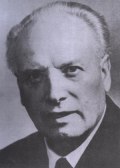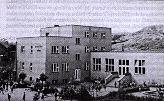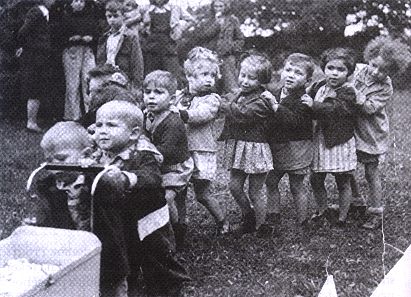
Welcome to the ezine produced by SGI Buddhists that prompts the positive, kindles the constructive, highlights the hopeful and leaves you feeling - well, up!


Thanks to Steven Spielberg the name of Oskar Schindler is known the world over, but this piece is about an almost forgotten contemporary of Schindler, who deserves a similar place in history.
By Nick Carey for Radio Praha
In the course of the tumultuous 20th century, Premysl Pitter, born in Prague in 1895, did more than perhaps anyone else to help children - Czech, German and Jewish - through some of the most horrific moments of European history.
I'll start in the present day. The Premysl Pitter primary school was opened a few years ago in the industrial city ofPremysl Pitter was the son of middle-class parents, who ran
a printing press in the heart of old
As with so many young men of his generation, the turning
point in Premysl Pitter's life came in the First World War. As a young soldier
he witnessed the horrors of the trenches on the Italian front, and came close
to facing a firing squad when he found himself unable to shoot at his fellow
men. He returned home a Christian and a pacifist and convinced that having
survived the war, he owed the rest of his life to others. When he saw the
appalling conditions in which thousands of war widows were left to bring up
their families alone and without money, he started to work with children. In
the young Czechoslovak state he worked intensively with children from the poor
Blanka Sedlackova, now 73, remembers as a child going to the
Milicuv dum, the centre that Pitter and Fierz opened in Zizkov in 1933. At a
time when
"At the age of 10 I started going there with my
sister. The Milicuv dum was unique in
 The reputation of the Milicuv dum and of its director spread
internationally, and Pitter's writings on education and theology became well
known. His pacificist views did not endear him to the state, and on one
occasion Albert Einstein wrote to Czechoslovak President Tomas Masaryk to
appeal for clemency, when Pitter faced a prison sentence for his pacifism.
The reputation of the Milicuv dum and of its director spread
internationally, and Pitter's writings on education and theology became well
known. His pacificist views did not endear him to the state, and on one
occasion Albert Einstein wrote to Czechoslovak President Tomas Masaryk to
appeal for clemency, when Pitter faced a prison sentence for his pacifism.
On
Blanka Sedlackova remembers.
"One day they took him to the Gestapo headquarters
and accused him of taking in Jewish children. Pitter was never able to tell a
lie. He looked at the man, confirmed that it was true and added - 'From a human
point of view I'm sure you can understand why I'm helping these children.'
After a long an
Tragically, few of the Jewish children survived the war. Despite Pitter's efforts, the Nazi machine eventually caught up with the Milicuv dum, and most of the children were taken away in the transports.
On the morning of
"Thousands of people were forced to sleep on the bare ground without blankets. The very sick and children lay in the blazing sun in unthinkable filth with flies crawling everywhere. The latrines and the paths that led to them were filthy from people with dysentery, who could walk no further and were lying in their own excrement."
 Pitter was horrified to see that the newly liberated
Pitter was horrified to see that the newly liberated
"Strangely enough, people from the neighbourhood were still full of memories of the war and they didn't look at what he was doing with sympathetic eyes, but we children who just came back from the camps, had much more understanding and in a way even compassion, because I believe that if somebody suffered so much he can have another kind of relationship, even to people who made him so much trouble."
And Jehuda Bacon remembers that it was the amazing charisma of Premysl Pitter that made this extraordinary reconciliation possible.
"We didn't trust anybody after the war. Why should people be kind or good to us? And here we met Premysl Pitter, who was for us at that time a symbol of goodness, and he slowly won our hearts and minds. We trusted again and began to believe again in human beings. This was one of his main achievements."
Today there is a tree on the Hill of Remembrance in
But this is still not the end of the story. After the
communist take-over, Pitter, as a Christian and a pacifist, soon came to be
seen as an enemy of the state, and it became clear that in Stalinist
Czechoslovakia he faced imminent imprisonment. In 1951, like thousands of his
countrymen, he reluctantly fled to
A quarter of a century after his death, Premysl Pitter's
legacy has a very real significance, especially as the Czech Republic gradually
comes to terms with its own multi-cultural, multi-ethnic make-up. Back at the
Premysl Pitter primary school in
"When we opened the school, there were people at the official opening who had worked with Premysl Pitter and children he had taken care of. One of them was the priest Mr Simsa, who gave a speech. He said that if Premysl Pitter were alive today, he would be taking care of Romany children. I think it is apt that our school is named after him, because we are trying, at least in our own small way, to follow in his footsteps, to help children who are deprived."
And I shall leave the very last word to Blanka Sedlackova, who knew Pitter for much of his working life:
"Just before he went into exile, he said a wonderful
thing to us - 'If you build from iron, the metal rusts, if you build from wood,
the wood rots, even marble crumbles in the end. But your material, the soul of
the child, is eternal.' That was Premysl Pitter's lifelong creed."
http://www.radio.cz/en/article/36669

